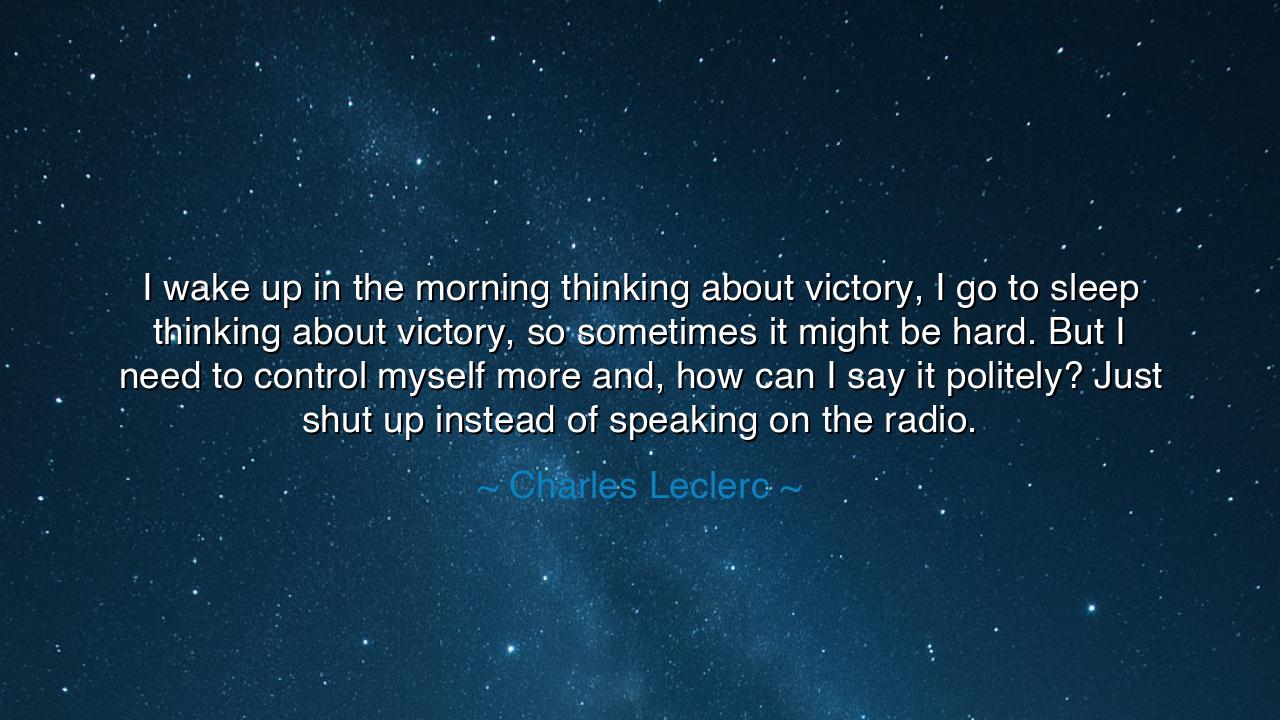
I wake up in the morning thinking about victory, I go to sleep
I wake up in the morning thinking about victory, I go to sleep thinking about victory, so sometimes it might be hard. But I need to control myself more and, how can I say it politely? Just shut up instead of speaking on the radio.






The words of Charles Leclerc burn with the restless fire of ambition and the humility of self-reflection: “I wake up in the morning thinking about victory, I go to sleep thinking about victory, so sometimes it might be hard. But I need to control myself more and, how can I say it politely? Just shut up instead of speaking on the radio.” Here speaks not only a Formula 1 driver, but a man at war with his own passions, striving to balance the consuming hunger for triumph with the discipline of silence and composure.
The meaning of this quote lies in the paradox of greatness. To be a champion, one must carry an obsession with victory — a fire that fuels every action from dawn until dusk. Yet that same fire, if uncontrolled, can consume its bearer. Leclerc admits that his yearning to win drives him to outbursts, frustrations, and moments of weakness when the world is listening. His words reveal a truth that all who seek excellence must face: that mastery requires not only skill and desire, but also the discipline to tame one’s own emotions.
The origin of these words rests in the world of Formula 1, where every second is precious and every decision magnified. Leclerc, a prodigy from Monaco, rose to Ferrari with the hopes of millions on his shoulders. Yet the path of a driver is fraught with setbacks — mechanical failures, strategic blunders, rivals faster on the day. In such moments, emotions often overflow in radio messages broadcast to the world. Leclerc’s confession is a recognition of his own humanity: his need to temper frustration, to find strength not only in speed, but in silence.
History offers many examples of such inner struggles. Alexander the Great conquered nations but often battled his own temper, which sometimes cost him friendships and alliances. Napoleon, though a master of strategy, was undone as much by his pride as by his enemies. In contrast, Marcus Aurelius, though beset by wars, sought calm through philosophy, teaching himself to govern not only his empire but his own soul. So too does Leclerc point to this ancient truth: that the fiercest battle is often not with others, but with oneself.
There is wisdom here also about patience. Victory does not always come swiftly, nor does it bend to desire alone. To wake and sleep with thoughts of triumph is noble, but to endure disappointment with composure is divine. By restraining his words, by holding back the frustration that flares in the moment, Leclerc seeks to strengthen his own spirit. Silence, in this sense, is not weakness but power — the power to endure, to listen, to rise stronger when the next dawn comes.
The lesson for us is clear: let ambition drive us, but let discipline guide us. It is natural to hunger for success, to dream of victory in every waking thought. But when setbacks arise, do not let passion betray you into words or actions that diminish your strength. Instead, cultivate calm, learn when to speak and when to remain silent, and remember that true mastery is found not only in conquest but in self-control.
So let us take Charles Leclerc’s words into our own lives. Let us dream with the fire of victory, rise with ambition, and fall asleep with purpose. But let us also guard our tongues, restrain our tempers, and nurture patience. For as he teaches, greatness is not only to drive fast on the track, but to command the storm within. In silence, as in speed, lies the true path to victory.






AAdministratorAdministrator
Welcome, honored guests. Please leave a comment, we will respond soon